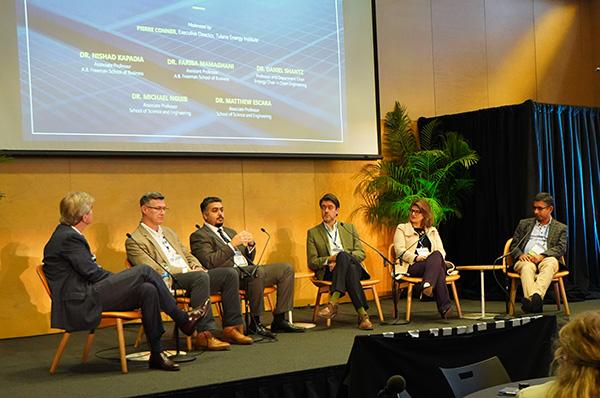Tulane Energy Institute co-hosts Clean Energy Investment Symposium

The Tulane Energy Institute at the A. B. Freeman School of Business partnered with wealth management firm Janney Montgomery Scott to host the inaugural Clean Energy Investment Symposium.
The conference, which took place Dec. 5-7 in the Lavin-Bernick Center on Tulane’s uptown campus, attracted more than 250 investors and investment managers interested in getting an in-depth look at emerging technologies and the industry's leading firms.
“The symposium was a great success,” said Pierre Conner, executive director of the Tulane Energy Institute. “It was the result of several years of hard work positioning Tulane and the Freeman School to be at the forefront of the transition to sustainable energy, through both innovative research and outstanding classroom teaching.”
The event kicked off with a breakfast keynote from Mark Widmar, CEO of photovoltaic (PV) panel manufacturer First Solar, who discussed the bright future of solar power. Delivering the afternoon keynote was Louisiana Gov. John Bel Edwards, who outlined the state’s ambitious Climate Action Plan.
The program was rounded out by panel discussions devoted to a host of clean energy topics, including solar, batteries and minerals, renewable fuels, carbon capture utilization and storage, and carbon free base load power generation.
The symposium also highlighted Tulane's clean energy research. Conner moderated a panel discussion featuring Tulane researchers Nishad Kapadia, associate professor of finance; Fariba Mamaghani, assistant professor of management science; Daniel Shantz, Entergy Chair in Clean Energy Engineering in the Department of Chemical and Biomolecular Engineering; Michael Naguib, associate professor of Physics and Engineering Physics; and Matthew Escarra, associate professor of Physics and Engineering Physics.
The Tulane faculty members, spanning the business school and the School of Science and Engineering, offered distinctly different approaches to clean energy research. The Freeman School's Kapadia talked about his work on the drivers behind lowering state-level carbon emissions, while his colleague Mamaghani discussed her research on electric power markets, highlighting the relationship between the growth of residential solar and rising electricity prices.
School of Science & Engineering faculty members, on the other hand, discussed their work on developing clean energy materials and technologies.
“What's going on [at Tulane] tends to be early in the TRL (technology readiness levels) ladder, so we typically are looking at things that are TRL 1 to 3,” Shantz explained. “Part of this is the focus of the university and admission, part of this is to complement student training, but I think Tulane is well represented across many of the spaces this group will be interested in.”
Naguib discussed his lab’s research on next-generation battery materials, and Escarra highlighted the university’s research in the emerging field of two-dimensional materials, a new class of materials that offers great promise for clean energy applications.
“One of them is a very good semiconductor that actually makes for an incredibly good solar material,” said Escara. “Its absorption of sunlight per weight and volume is higher than any other material we know of. It offers the potential for very high power density solar cells, which would be really useful for aerospace, space-based missions, in building integrated solar and other applications on Earth.”
Conner said he hopes the symposium will become an annual event at Tulane highlighting the business opportunities of clean energy.
“Based on our geographic location and research and teaching expertise, Tulane can be a national leader in the clean energy transition,” said Conner. “Given the great attendance at this inaugural symposium, I think it’s clear that investors are looking for this type of information, and we’re uniquely equipped to provide them with it.”
Interested in advancing your education and/or career? Learn more about Freeman’s wide range of graduate and undergraduate programs. Find the right program for you.
Other Related Articles
- Politico: Trump administration moves closer to opening Venezuela to more US oil producers
- Alumna leverages Freeman network to land dream job at Entergy
- Jobs fuel growth of MME program
- Tulane Energy Institute gets major gift from Templeton family, new name for Trading Center
- WVUE Fox 8: How the Middle East conflict is affecting oil prices
- WDSU: Gas prices face uncertainty after US strikes on Iran
- Four honored with Freeman research awards
- NOLA.com: Hydrogen could be a key resource to fueling Louisiana's future. Here's how.
